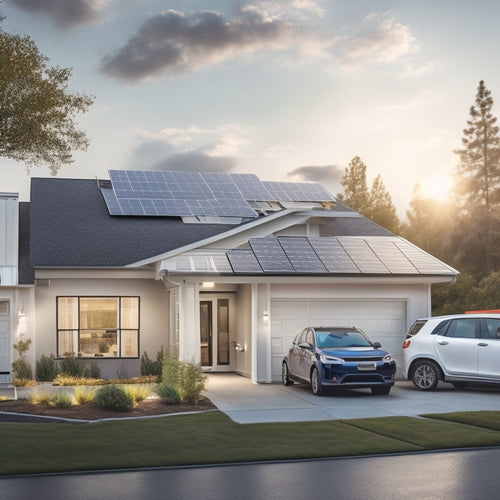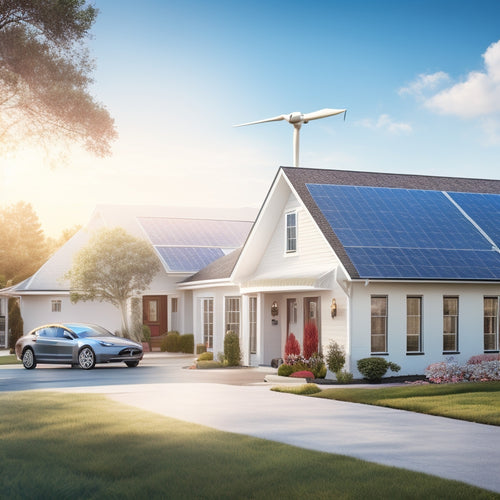
Buy and Install Solar Panels for Your EV Online
Share
You're looking to buy and install solar panels for your EV online, reducing your carbon footprint and energy costs. Start by choosing the right solar panel type - monocrystalline, polycrystalline, or thin-film - considering efficiency, durability, and cost. Evaluate your EV's energy needs, selecting a reputable online retailer with transparent policies and good reviews. Guarantee correct installation, maintaining your panels regularly to optimize energy output. With proper guidance, you can achieve a low-carbon EV lifestyle, and that's just the beginning of your journey towards a more sustainable future.
Key Takeaways
• Assess your EV's energy needs by calculating daily energy consumption and identifying charging patterns and habits.
• Choose the right solar panel type (monocrystalline, polycrystalline, or thin-film) based on efficiency, cost, and durability.
• Select a reputable online retailer by researching, reading reviews, and checking for transparency and accountability.
• Ensure compatibility between solar panels and your EV's electrical system before installation to prevent electrical system overload.
• Properly install solar panels on your EV, following manufacturer's guidelines, to achieve optimal energy production and safety.
Benefits of Solar Panels for EVs
By integrating solar panels into your electric vehicle (EV) charging system, you can greatly reduce your reliance on the grid and lower your carbon footprint, often by as much as 70%. This significant reduction in emissions is an essential step towards a cleaner, more sustainable future.
With solar-powered EV charging, you'll be producing zero emissions, reducing your environmental impact, and contributing to a healthier planet. By harnessing the power of the sun, you'll be minimizing your reliance on fossil fuels, a major contributor to climate change.
Additionally, solar panels require minimal maintenance, ensuring a hassle-free charging experience. By choosing solar-powered EV charging, you're not only reducing your carbon footprint but also supporting a cleaner, more sustainable transportation system.
As you drive your EV, you'll be doing so with the knowledge that you're contributing to a healthier environment, free from the negative impacts of traditional fossil fuels.
Choosing the Right Solar Panel
When selecting the right solar panel for your EV, you'll need to assess the type of panel that suits your needs, as well as its efficiency and cost.
You'll want to determine whether monocrystalline, polycrystalline, or thin-film panels are the best fit for your setup.
Solar Panel Types
You'll encounter three primary types of solar panels on the market: monocrystalline, polycrystalline, and thin-film, each with its unique characteristics, advantages, and limitations that can greatly impact their performance and suitability for your electric vehicle's energy needs.
When selecting a solar panel, it's important to take into account the type that best fits your requirements. Here's a brief comparison of the three types:
| Type | Characteristics |
|---|---|
| Monocrystalline | High efficiency, durable, and expensive; ideal for small spaces |
| Polycrystalline | Lower efficiency, less expensive, and suitable for large spaces |
| Thin-Film | Low efficiency, flexible, and affordable; suitable for curved surfaces |
Monocrystalline solar panels boast high efficiency and durability, making them ideal for small spaces. Polycrystalline panels offer a lower efficiency at a lower cost, making them suitable for larger spaces. Thin-film panels, with their flexible design and affordable price, are perfect for curved surfaces. Take into account your electric vehicle's energy needs, available space, and budget when choosing the right solar panel type. Remember, a sturdy Solar Panel Frame is important for supporting your chosen panel. Lastly, Thin Film Technology has opened up new possibilities for solar panel design and installation.
Efficiency and Cost
Choosing the right solar panel for your electric vehicle involves balancing efficiency and cost, as a higher-efficiency panel may not always be the best value if it breaks the bank. You'll want to weigh the trade-offs between panel efficiency, cost, and overall performance.
A more efficient panel may produce more energy per hour of sunlight, but it may also come with a higher price tag. To make an informed decision, you'll need to conduct a cost breakdown. Calculate the cost per watt of each panel, and take into account the total cost of the system.
You may find that a less efficient panel with a lower upfront cost is a better value in the long run. As the industry approaches grid parity, the cost of solar energy is becoming increasingly competitive with traditional fossil fuels.
Measuring Your EV's Energy Needs
Measuring Your EV's Energy Needs
To determine the size of the solar panel system you'll need, you must first calculate your EV's daily energy consumption in kilowatt-hours (kWh). This involves conducting an energy audit to identify your charging patterns and habits.
Start by tracking your daily mileage and charging frequency. Do you charge your EV daily, or only a few times a week? How many miles do you drive on average per day? These details will help you determine your energy requirements.
Next, consider your charging patterns. Do you typically charge your EV at home, at work, or at public charging stations? Are you using a Level 1, Level 2, or DC Fast Charger? Knowing your charging patterns will help you determine the total energy consumption of your EV.
Selecting a Reputable Online Retailer
When searching for an online retailer to buy solar panels, it's important to research and select a reputable provider that can guarantee a seamless and reliable purchase experience. You want a retailer that's transparent about their products, services, and business practices.
To make sure you're making an informed decision, read online reviews from multiple sources, such as independent review websites, social media, and forums. Pay attention to the overall rating, comments, and feedback from previous customers. Look for patterns or red flags, like shipping issues, poor customer service, or low-quality products.
Additionally, check the retailer's website for transparency. A reputable retailer should clearly display information about their products, warranties, return policies, and customer support. Be wary of retailers that lack this transparency, as it may indicate a lack of accountability.
Understanding Solar Panel Efficiency
When you're shopping for solar panels, you'll want to grasp the concept of efficiency, which is essential for maximizing energy production.
You'll need to take into account how well your panels convert sunlight into electricity, how temperature affects performance, and what rating systems mean for your energy output.
Panel Energy Conversion
Your solar panel's energy conversion efficiency, typically ranging from 15% to 20%, plays a vital role in determining how effectively it converts sunlight into electrical energy for your EV. This efficiency rate is important, as it directly impacts the amount of power your EV can harness from the sun. A higher efficiency rate means more energy is generated, resulting in a faster charging time for your vehicle.
Here are some key aspects to keep in mind when it comes to panel energy conversion:
-
Energy Flow: The path sunlight takes as it's absorbed, converted, and transmitted as electrical energy to your EV.
-
Power Dynamics: The balance between the energy input (sunlight) and output (electrical energy) affects the overall efficiency of the system.
-
Photovoltaic Effect: The process by which sunlight excites electrons, generating an electrical current.
- Thermal Losses: Heat generated during the energy conversion process can reduce efficiency, underscoring the importance of proper system design and installation.
Cell Temperature Impact
As you consider the energy conversion process, it's important to recognize that the temperature of your solar panel's photovoltaic cells can greatly impact their efficiency, with even slight increases in temperature reducing their ability to generate power. This is because high temperatures can increase the internal resistance of the cells, reducing their overall efficiency.
| Temperature (°C) | Efficiency (%) | Power Output (W) |
|---|---|---|
| 25 | 20 | 200 |
| 30 | 18 | 180 |
| 35 | 15 | 150 |
As you can see from the table, even a 5°C increase in temperature can result in a 2% decrease in efficiency and a 20W decrease in power output. This highlights the importance of considering heat resistance when selecting and installing your solar panels. Temperature fluctuations can have a significant impact on your solar panel's performance, so it's essential to choose panels with high heat resistance to minimize these effects. By doing so, you can make sure your solar panels operate at peak efficiency, providing the maximum amount of power for your EV.
Efficiency Rating Systems
How do solar panel manufacturers guarantee the efficiency of their products, and what do their efficiency ratings really mean for your EV's charging needs? As you explore solar panel options for your electric vehicle, understanding efficiency ratings is important. Manufacturers use certification standards and energy labels to make sure their products meet specific efficiency standards.
Here are key aspects of efficiency rating systems to take into account:
-
Certification Standards: Look for certifications like UL (Underwriters Laboratories) or IEC (International Electrotechnical Commission) marks, which guarantee the product meets safety and performance standards.
-
Energy Labels: Energy labels, such as the European Union Energy Label, provide a standardized way to compare the energy efficiency of different solar panels.
-
Efficiency Ratings: Efficiency ratings, usually expressed as a percentage, indicate how much of the sun's energy is converted into electrical energy.
- Performance Warranty: Check the manufacturer's performance warranty, which typically guarantees a minimum level of energy output over a specified period.
Installing Solar Panels on Your EV
You'll need to verify that your electric vehicle's (EV's) electrical system can handle the added power input from the solar panels before installing them. This is essential to guarantee seamless EV integration and prevent any electrical system overload. Consult your EV's manual or manufacturer's website to determine the maximum power input capacity.
Once you've confirmed compatibility, it's time to install the solar panels. Mount the panels on your EV's roof or hood, ensuring a secure and watertight seal. Connect the panels to your EV's electrical system, following the manufacturer's guidelines for wiring and electrical connections. Be cautious when working with electrical systems to avoid any accidents or damage.
In case you encounter any issues during installation, don't hesitate to seek roadside assistance or consult with a professional electrician.
Maintenance and Upkeep Tips
Regularly inspect your solar panels for dirt, debris, and signs of wear to guarantee maximum energy harvesting and prevent damage to your EV's electrical system. By doing so, you'll secure peak performance and extend the lifespan of your solar panels. Daily inspections can help you identify potential issues early on, saving you from costly repairs down the line.
Here are some essential maintenance tips to keep in mind:
-
Perform daily inspections to check for dirt, debris, or signs of wear
-
Clean your solar panels seasonally to remove dirt and debris that can reduce energy output
-
Check your solar panel connections regularly to ensure they're secure and free from corrosion
- Keep a record of your maintenance activities to track performance and identify areas for improvement
Cost Savings and Incentives
In addition to installing solar panels for your electric vehicle, you can greatly decrease your reliance on the grid and cut your energy bills by up to 50%. This significant reduction in energy costs can help offset the initial investment in your solar panel system.
Additionally, you'll be eligible for federal Tax Credits, which can cover up to 26% of the total system cost. Furthermore, you may be eligible for State Rebates, which vary by state but can provide even more savings. These incentives can greatly reduce the upfront cost of going solar, making it a more accessible and affordable option for EV owners.
Popular Solar Panel Brands Online
When shopping online for solar panels for your EV, you can choose from a wide range of reputable brands, each offering unique features, warranties, and pricing structures. This allows you to find the perfect fit for your needs and budget.
Some popular solar panel brands online include:
-
Panasonic: Known for their high-efficiency panels and 25-year warranty, Panasonic is a top choice for EV owners. Their panels are designed to provide maximum energy output, making them ideal for EV charging.
-
Tesla: As a pioneer in the EV industry, Tesla offers a range of solar panels designed specifically for EV owners. Their panels are sleek, efficient, and integrate seamlessly with their EV charging systems.
-
LG: With their premium solar panels, LG offers high-efficiency energy output and a 25-year warranty. Their panels are designed for durability and performance, making them a popular choice for EV owners.
- Hanwha Q CELLS: This brand offers high-performance solar panels with a 25-year warranty. Their panels are designed for maximum energy output, making them suitable for EV charging.
When researching these brands, be sure to read brand reviews and comparisons, such as Panasonic comparisons, to find the best fit for your EV and solar panel needs.
Frequently Asked Questions
Can I Install Solar Panels on My EV Myself?
While you can attempt to install solar panels on your EV yourself, be aware of the DIY challenges and safety precautions involved, as improper installation can compromise your vehicle's electrical system and pose risks to your safety.
Are Solar Panels Compatible With All EV Models?
You'll find that solar panels aren't universally compatible with all EV models; it's important to check your vehicle's manufacturer guidelines, considering model variations, to guarantee a seamless integration and peak performance.
Do Solar Panels Drain My Ev's Battery?
"A million questions racing through your mind, and one of them is: do solar panels drain your EV's battery? Rest assured, they don't; in fact, they enhance energy efficiency, prolonging your battery life."
Can I Use Solar Panels to Charge My EV on the Go?
On your next road trip, you can harness the sun's power to top off your EV's battery with portable solar panels, providing a convenient, emission-free charging solution that's perfect for adventurous souls like you.
Are Solar Panels for EVS Covered Under Warranty?
When you invest in solar panels for your EV, you'll likely wonder if they're covered under warranty. Typically, manufacturers offer a 10-25 year warranty, providing you with peace of mind and support in case anything goes wrong.
Related Posts
-

What Electric Vehicle Owners Need for Home Energy
As an electric vehicle owner, you need to optimize your home energy system to guarantee efficient, sustainable, and c...
-

Why Homeowners Are Embracing DIY Energy Independence
By taking control of your energy needs, you're breaking free from the uncertainty of utility bills and embracing a se...
-

What Role Do Unicycles Play in Urban Transport?
As you navigate through congested city streets, unicycles emerge as a viable solution, slashing carbon emissions by u...


